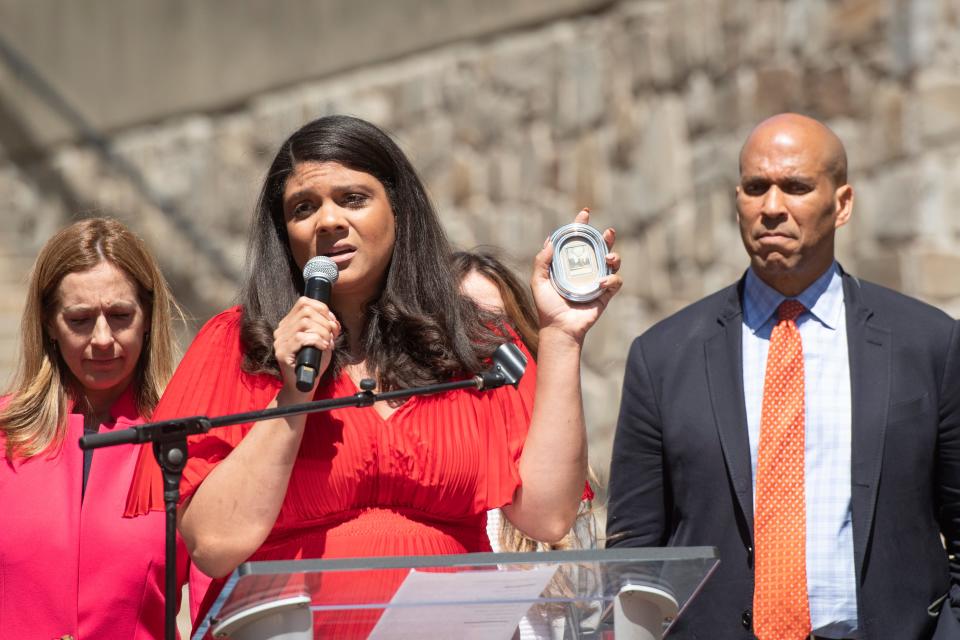Here's how NJ homeowners facing foreclosure can get a second shot under new law
- Oops!Something went wrong.Please try again later.
Family members, lower income bidders, tenants and community development corporations will have an easier time purchasing foreclosed homes after Gov. Phil Murphy signed a bill Friday that overhauls the sheriff’s sale process.
Under the Community Wealth Preservation Program (A5664/S4240), New Jersey homeowners experiencing foreclosure, their next of kin, or tenants living in a foreclosed property would have “the right of first refusal” — or first shot when the property goes up for auction — at the upset price, which is the minimum price a seller would accept. That typically includes the outstanding mortgage, interest, fees and other costs.
The law aims to give lower-income families a leg up against large investment companies buying and flipping single-family homes at a growing rate. It lets a foreclosed-upon family, their family members, or tenants of the property to put down 3.5% at the auction, as opposed to the 20% deposit usually required.
“Black and brown wealth is hemorrhaging through the loss of foreclosed property, and the people who live in the community often do not have deep enough pockets to even participate in the foreclosure process,” said state Sen. Britnee Timberlake, D-Essex, the lead sponsor of the bill.
More: Bill headed to Murphy would help low-income bidders buy foreclosed homes in NJ more easily
“This bill is a creative opportunity for families to save their wealth at the time of a foreclosure sale by using financing,” Timberlake said. “This legislation also levels the playing field for renters, affordable housing nonprofit developers and people who want to purchase an abandoned home to restore and live in or to create affordability. This is what equity in systems look like.”
In September 2022, Murphy conditionally vetoed a similar bill (A793/S1427), writing he “wholeheartedly” supported the overarching objectives of the bill, but that he had “serious reservations regarding the legality, practicality, and unintended consequences of several of the proposed mechanisms for achieving these goals.”
New bill after Murphy's conditional veto
In the conditional veto, he asked lawmakers to rework language dealing with caps to auction prices, and properties that don’t sell at sheriff’s sales, among other things. He struck out a section of the bill that said the upset price — or minimum price accepted by a bank — must be capped at no higher than 50% of the outstanding mortgage, interest, fees or other costs owed.
Lawmakers reintroduced a new version of the bill, as opposed to voting to accept the language, or overriding the veto, and took out the 50% cap language.
More: Murphy conditionally vetoes bill to overhaul home foreclosure. What he wants changed
"That’s the key difference and that’s the reason our opposition was redrawn and we’re neutral on it," said Michael Affuso, head of the New Jersey Bankers Association. "That was clearly problematic, that everyone could decide to default so they could get their principal reduced.
"When something like that could happen, government-sponsored entities like Fannie Mae and Freddie Mac could look and say, 'Wait a second, every mortgage that we own in New Jersey is potentially worth significantly less than we think it's worth, so we're just not going to buy mortgages in New Jersey,'" Affuso said.
The bill Murphy signed on Friday also gave the right of first refusal to tenants of foreclosed-upon properties, which was not included in the previous bill, and required upset prices be made public at least four weeks before the sheriff's sale, among other small changes.
How it works

For those who put down a 3.5% deposit at the auction, the rest would be owed within 90 days by cash, certified or cashier’s check, or wire transfer. They can pay with financing if they plan to use the home as their primary residence for at least seven years, and provide proof they have been pre-approved by a financial institution.
They must live in the home for at least seven years, though there are a handful of hardship exemptions for homeowners, like if the bidder or their spouse or child dies, the bidder becomes disabled or loses income.
A nonprofit community development corporation would have the second right of refusal if it agrees in writing to buy the property for the foreclosed upon family, their next of kin, or the tenant. The organization must negotiate an affordable lease for the family and give them the option to buy the property back from the organization.
“For too many, the dream of homeownership feels far out of reach,” Murphy said. “We are creating a new avenue to homeownership for individuals and families throughout New Jersey, giving many the opportunity to remain in the homes and communities they cherish while also protecting our neighborhoods from rapid investor-driven homebuying.”
This article originally appeared on NorthJersey.com: NJ homeowners facing foreclosure get second shot under new law

